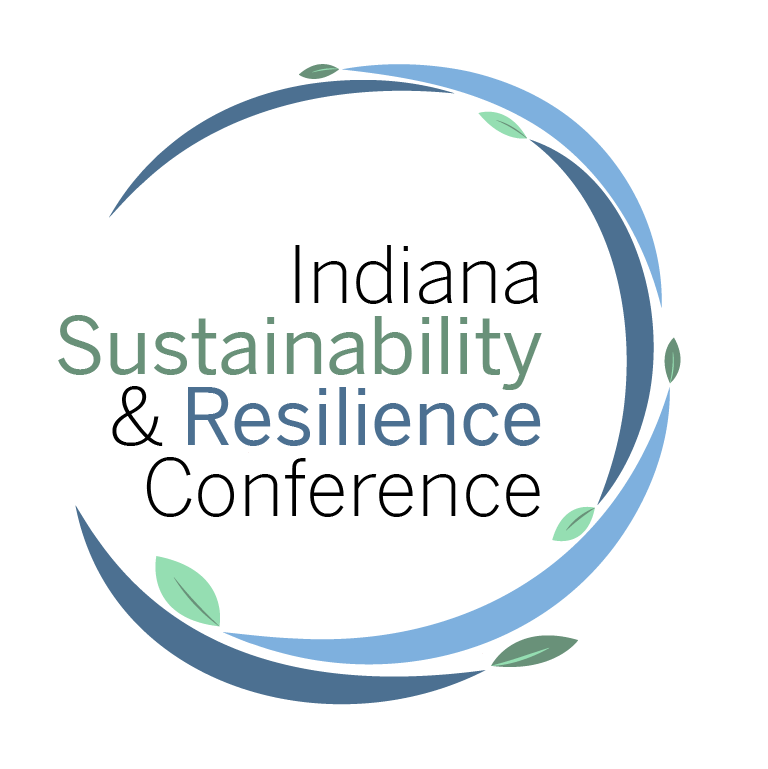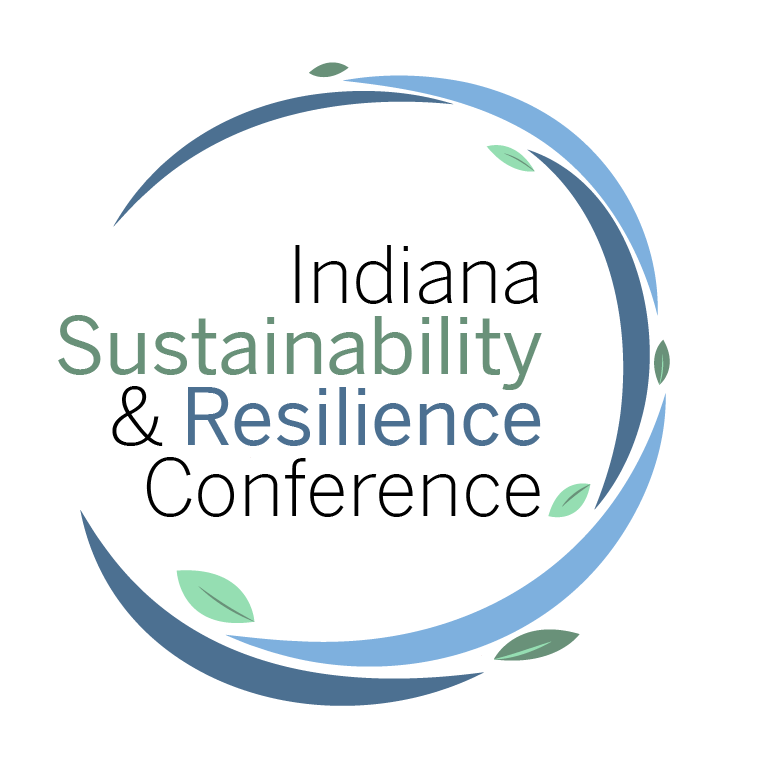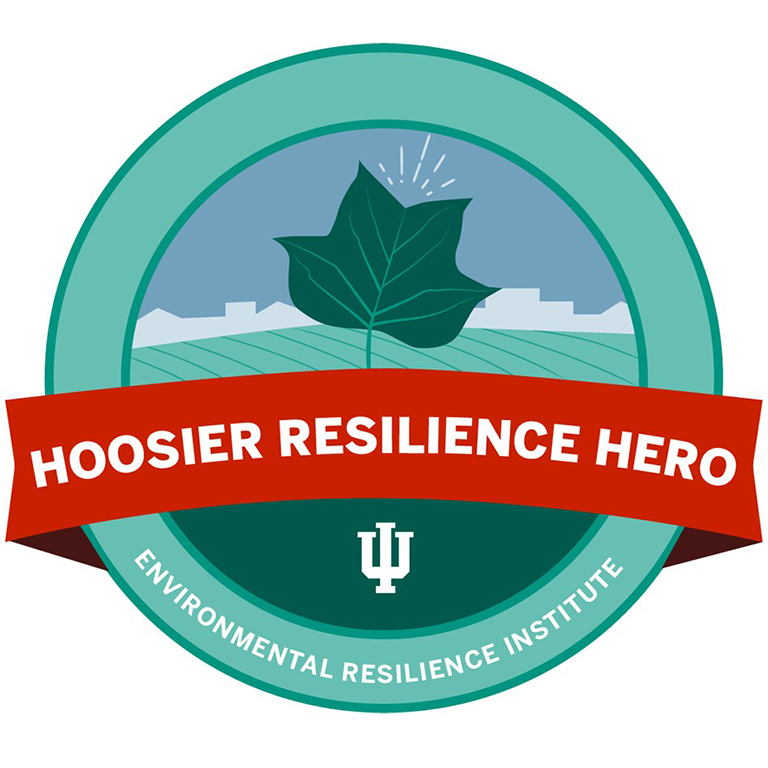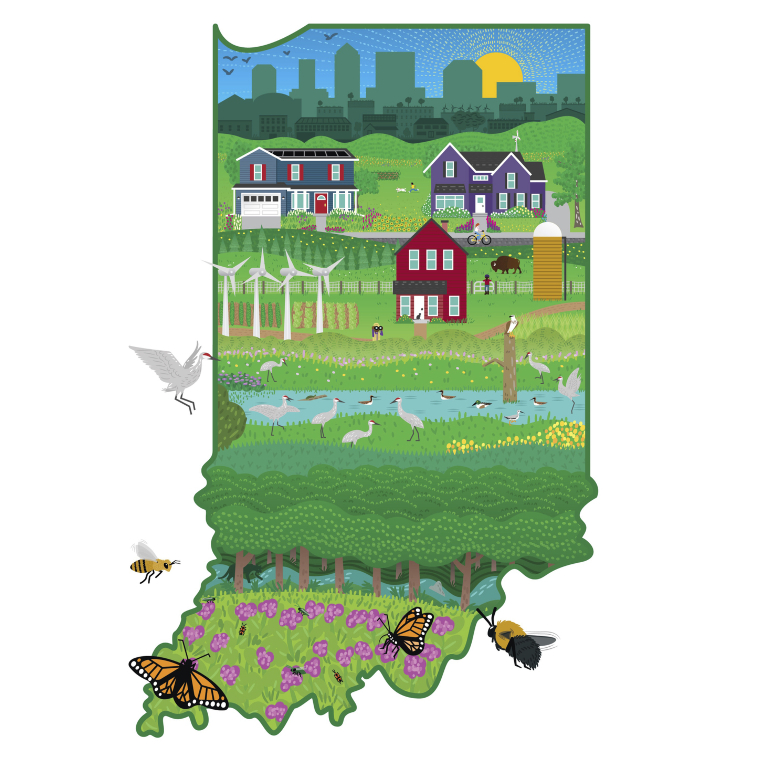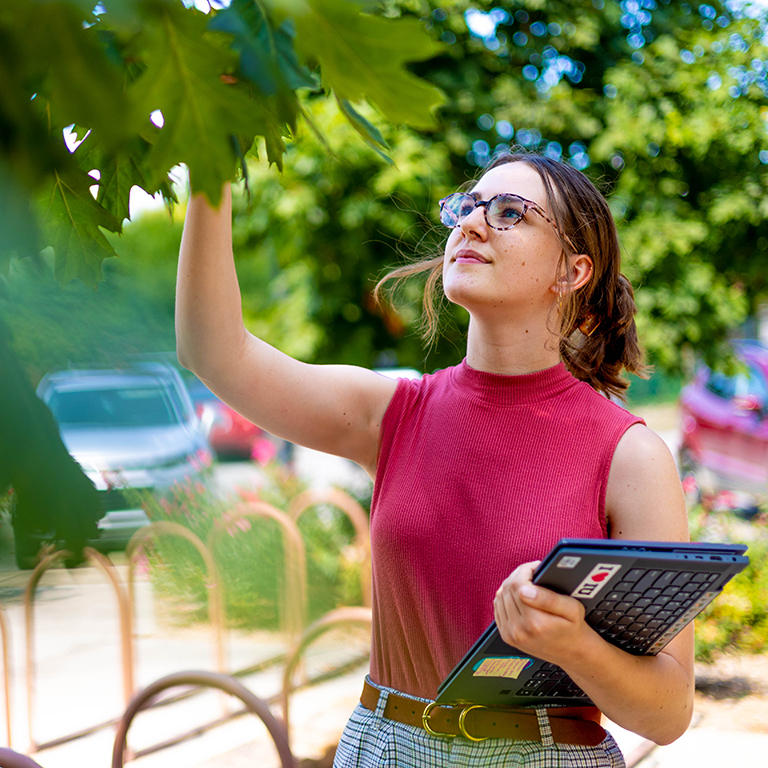Description of the video:
1
00:00:02,480 --> 00:00:08,880
So the McKinney Climate Fellowship is a
program that allows students to become
2
00:00:08,880 --> 00:00:15,280
partnered with different organizations
that have a sustainability aspect in mind.
3
00:00:15,280 --> 00:00:19,520
Not only is it great for preparing you like
professionally and like learning those skills,
4
00:00:19,520 --> 00:00:25,440
but also just kind of seeing the different
ways you can go in the environmental sector.
5
00:00:25,440 --> 00:00:28,800
You learn a lot of stuff in
class and you ask yourself,
6
00:00:28,800 --> 00:00:31,440
"Okay, what does this actually look like?"
7
00:00:31,440 --> 00:00:35,720
Having that real-life experience and
seeing how do I put these skills that
8
00:00:35,720 --> 00:00:42,760
I've learned from books into real world
is something that this Fellowship offered.
9
00:00:42,760 --> 00:00:47,520
I worked directly in the Department of
Public Works with the City of South Bend.
10
00:00:47,520 --> 00:00:51,960
I was taking concepts that I've learned in
class like data analysis and reporting and
11
00:00:51,960 --> 00:00:57,000
really putting them to work in the real world
and getting real-world experiences out of them.
12
00:00:57,000 --> 00:01:00,360
I was really excited to work
for Sycamore Land Trust.
13
00:01:00,360 --> 00:01:04,320
It's something that's been on my
radar since I entered grad school,
14
00:01:04,320 --> 00:01:12,080
just because I really think that land trusts are a
really beneficial way to go about land management.
15
00:01:12,080 --> 00:01:16,800
Being able to really have an
applied ecology position was
16
00:01:16,800 --> 00:01:22,280
something that really brought me a lot of
excitement to work for Sycamore Land Trust.
17
00:01:22,280 --> 00:01:25,680
I knew that I wanted to do something
with urban green infrastructure,
18
00:01:25,680 --> 00:01:29,400
and so this internship was
really a perfect match for me.
19
00:01:29,400 --> 00:01:34,440
I was placed with the City of Terre Haute,
and I was working under their urban forester.
20
00:01:34,440 --> 00:01:39,840
I got to shadow her as she drove
around the city and checked on trees,
21
00:01:39,840 --> 00:01:42,920
and just like all the knowledge that
she gave me through that that I really
22
00:01:42,920 --> 00:01:46,040
couldn't have gotten anywhere else was fantastic.
23
00:01:46,040 --> 00:01:50,720
The McKinney Fellowship is important to our
organization because it provides us with
24
00:01:50,720 --> 00:01:56,360
students that are able to dive right into our
projects without having to have much training
25
00:01:56,360 --> 00:02:01,480
or background information on the nature of the
business or what's going on within the company.
26
00:02:01,480 --> 00:02:03,600
It was almost like having a third-party consultant
27
00:02:03,600 --> 00:02:06,840
being able to help us with all of
our different projects and tell us,
28
00:02:06,840 --> 00:02:08,560
for instance like an ESG report
29
00:02:08,560 --> 00:02:10,920
with other organizations within our industry,
30
00:02:10,920 --> 00:02:13,360
what's fake, what's not, what's good, what's bad,
31
00:02:13,360 --> 00:02:15,520
as we consider doing the
same with our own company.
32
00:02:15,520 --> 00:02:21,600
These students need opportunities, and I think
we have an obligation to provide them with that
33
00:02:21,600 --> 00:02:26,240
because they're the future leaders and
future workers and we want them to come
34
00:02:26,240 --> 00:02:30,280
away from the experience being very
positive and gaining better knowledge
35
00:02:30,280 --> 00:02:35,440
and I think it'll help direct their
path in the future and so I want to
36
00:02:35,440 --> 00:02:38,560
feel that we've made a small contribution to that.
37
00:02:38,560 --> 00:02:43,600
The Environmental Resilience
Institute is impressive.
38
00:02:43,600 --> 00:02:45,880
It's impressive what the students are doing,
39
00:02:45,880 --> 00:02:52,160
and we're here because we believe
that ERI is the partner to really
40
00:02:52,160 --> 00:02:56,040
make an impact in the state
of Indiana for all Hoosiers.
41
00:02:56,040 --> 00:02:59,840
Indiana University is the
premier institution in Indiana.
42
00:03:00,600 --> 00:03:04,080
Everything that we've asked them to
do and that they've promised to do,
43
00:03:04,080 --> 00:03:05,600
they've come through on it
44
00:03:05,600 --> 00:03:08,320
and they do it better than we expect.
45
00:03:08,320 --> 00:03:11,920
One thing I learned about myself through
my involvement with the Indiana Climate
46
00:03:11,920 --> 00:03:14,960
Fellows is that your voice always matters,
47
00:03:14,960 --> 00:03:16,560
no matter if you're a woman in the workplace,
48
00:03:16,560 --> 00:03:19,680
no matter if you're a college student
in a professional environment,
49
00:03:19,680 --> 00:03:22,160
you always have something to bring to the table.
50
00:03:22,160 --> 00:03:27,320
I would say that if given the opportunity,
any environmental sustainability,
51
00:03:27,320 --> 00:03:32,800
or just environmental student, should
do the McKinney Climate Fellows program.
52
00:03:32,800 --> 00:03:37,440
It's a fantastic program to really get on-the-job
53
00:03:37,440 --> 00:03:41,240
or on-the-field training
for whatever you want to do
54
00:03:41,240 --> 00:03:43,560
or even something you might be interested in.
55
00:03:43,560 --> 00:03:48,000
It ends up being this huge tie in of everything,
56
00:03:48,000 --> 00:03:54,280
and along the way you get to benefit a
community, and you get to be passionate, and
57
00:03:54,280 --> 00:03:59,720
you get to be creative, and you get to do these
projects that are going to make a difference.


